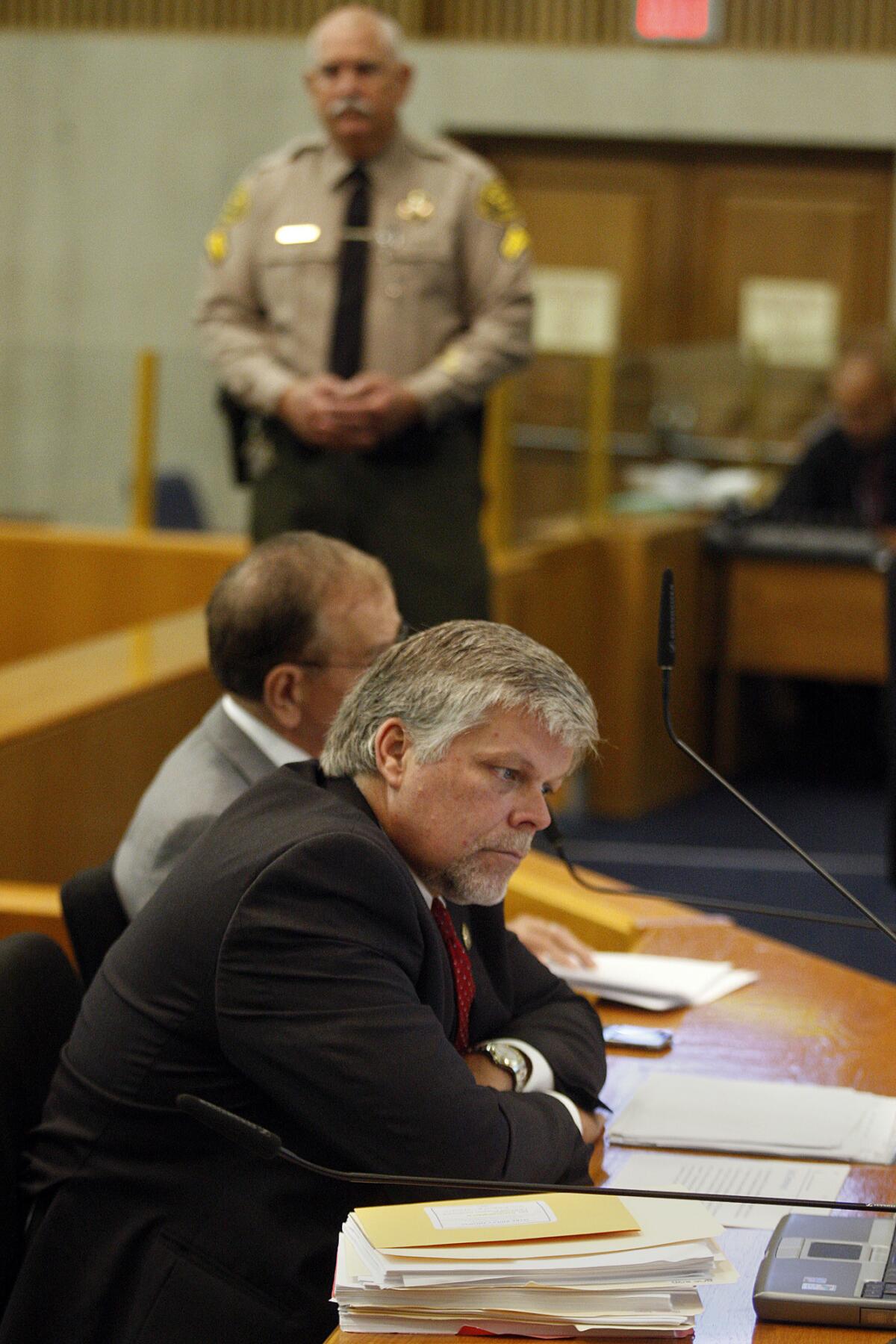Departing L.A. County probation chief set to receive nearly $295,000 severance

Jerry Powers, shown in 2013, is set to receive nearly $295,000 in severance after his exit as head of the city’s Probation Department.
- Share via
Los Angeles County supervisors agreed to pay Probation Department chief Jerry Powers at least $294,251 in severance when he resigned earlier this month amid an investigation into allegations that he misused his hiring authority to employ his alleged mistress.
Board members and their top lawyer, Mary Wickham, declined to comment on whether the county used taxpayer money for the payout, but county spokesman David Sommers issued a statement late Monday acknowledging that Powers had left with severance pay.
Sommers said Powers’ separation agreement “included a payment of $147,125.88 and an additional payment of $147,125.88.”
Following the release of the statement Monday evening, Sommers and Wickham declined to respond to requests to disclose any additional terms of Powers’ departure, including whether the amount of the payments would be subject to taxes.
County supervisors meeting in closed session Dec. 19 voted unanimously to accept Powers’ resignation. His departure becomes effective Jan. 4.
Under the terms of his contract, Powers is entitled to half of his annual $290,000 salary if he was forced out of his job, but Powers’ had announced his departure as a voluntary retirement.
County officials had hired an outside law firm to investigate the allegations of a romantic relationship between Powers and his aide, Kym Renner, before and after her hiring, according to a high-ranking Board of Supervisors aide familiar with the probe who requested anonymity because they were not authorized to speak about it publicly. Powers hired Renner to be the department’s top budget and personnel official with a $160,000 annual salary.
Additionally, county officials were looking into allegations that Powers bypassed the usual background checks to hire Renner, according to county managers with knowledge of the inquiry.
But the board never placed the severance arrangement on its agenda for public consideration. Members kept the vote tally confidential. Their lawyer issued a letter to The Times last week saying that the sum of taxpayer money that he would receive — and any other terms of the agreement — would remain confidential.
In the past, supervisors’ aides routinely disclosed the terms of severance packages for department heads, citing their obligations under state open meetings and public records statutes. But newly appointed county counsel Wickham said that would not be the case for Powers.
“He has a right to privacy over that,” Wickham told The Times. “He is a peace officer, so he has a heightened right to privacy, actually.”
In a letter to The Times, Wickham also cited an exemption to the state’s public records act that shields personnel information. But experts noted that the so-called personnel exemption does not cover compensation figures for public employees — including peace officers — and information about all forms of their pay are widely available on Internet sites.
“When you decide to become a public employee, you give up some of your privacy interests,” said Jessica Levinson, a Loyola Law School professor and president of the Los Angeles City Ethics Commission.
“The supervisors may have been reticent to disclose because it’s unpopular to give money to a person who leaves under a cloud of suspicion,” Levinson said. “It seems like a nice little goodbye gift.”
Levinson also noted that because of the secret nature of the negotiations, it’s impossible to know what leverage Powers used to win the money, and that approving the payout might have been a good business decision by the supervisors that prevents Powers from making any future claims against the county.
“This might have been a great financial calculation,” she said.
Earlier this year, a judge nullified a nearly $400,000 severance agreement between Pasadena City College and its previous president after finding that school trustees broke open meetings laws while negotiating the deal.
A nonprofit group, Californians Aware, filed a lawsuit claiming that the college’s board of trustees violated the Ralph M. Brown Act, the state’s open meetings laws, by not discussing and taking action on Mark Rocha’s retirement and severance package in public.
The Times had also sent a letter to the college detailing its own concerns over alleged Brown Act violations.
According to an email to all Probation Department staffers, Powers is due to be replaced on an interim basis by Cal Remington, a former Ventura County probation chief who led Los Angeles’ department on an interim basis in the past.
Join the conversation on Facebook >>
But that appointment was also never placed on the Board of Supervisors’ public agenda, and a vote has not been disclosed.
Supervisors Michael D. Antonovich, Don Knabe, Mark Ridley-Thomas and Hilda Solis did not respond to requests for comment about their severance package decision or why there was no public input on their subsequent hire.
In an interview, Supervisor Sheila Kuehl pledged to examine whether open meetings laws were followed in the case.
“If there are problems, we will rectify them,” she said.
Twitter: @gtherolf
ALSO
Bill Cosby posts $1 million bail after being charged with sexual assault
California officials upbeat about snowpack, but El Niño looms large on drought
More to Read
Sign up for Essential California
The most important California stories and recommendations in your inbox every morning.
You may occasionally receive promotional content from the Los Angeles Times.











